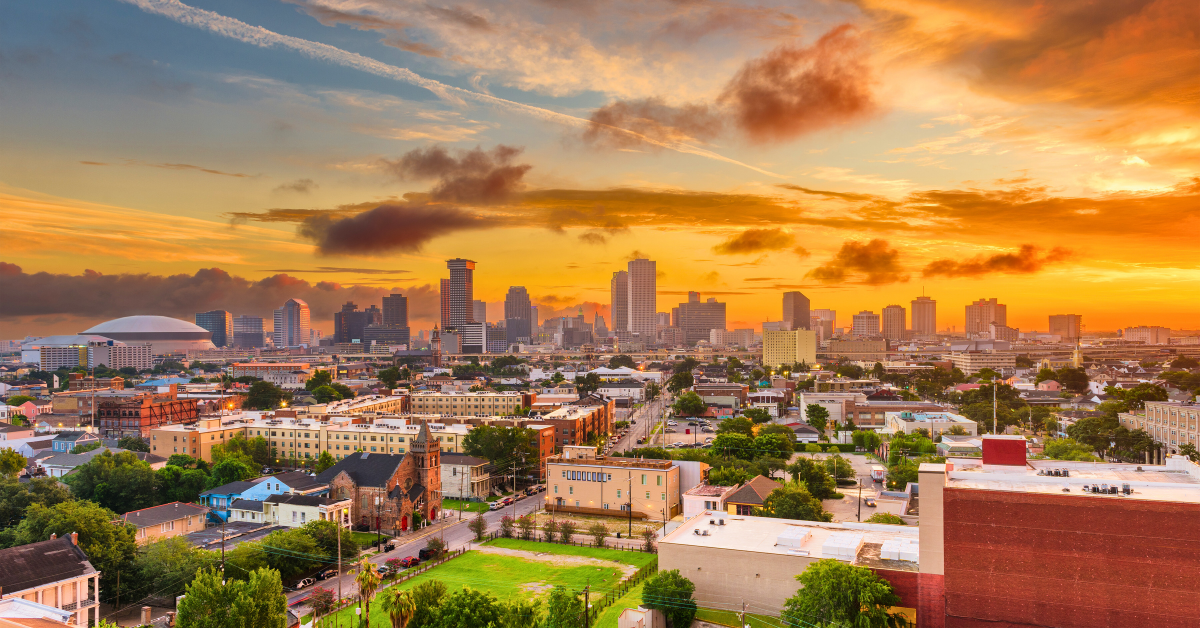New Orleans is renowned for the colourful Mardi Gras festival, spicy food, and, of course, jazz music. In fact, the main airport for the musical city on the banks of the Mississippi River is named after one of the most influential jazz artists of all time - Louis Armstrong. So it’s no surprise that this southern city attracts visitors from every continent.
Louis Armstrong New Orleans International Airport (MSY) is a busy international hub situated 11 miles west of the city centre. It serves all sorts of people, from those flying with commercial airlines to those chartering private jet.
If you want to enjoy everything the vibrant city of New Orleans has to offer, Louis Armstrong International Airport offers a range of convenient modern facilities centred on a single terminal with three concourses. The airport handles millions of passengers per year.
Key Information
Airport Name: Louis Armstrong New Orleans International Airport
IATA / ICAO Code: MSY / KMSY
Location: 11 miles west of New Orleans, Louisiana
Opening times: Louis Armstrong International Airport is open 24 hours a day
Terminals: Louis Armstrong International Airport has one terminal building with three concourses, three levels and 35 gates
Facilities & Other Services
Wi-Fi: There is free Wi-Fi throughout Louis Armstrong International Airport.
Lounges: There are three lounges at Louis Armstrong International Airport.
Shopping: There are around 15 stores at Louis Armstrong International Airport. These sell a variety of goods ranging from snacks, drinks, newspapers, gifts, and traveller essentials to clothing, accessories, and electronics.
Restaurants and Cafes: There are about 30 places to eat and drink at MSY airport, including coffee, bagel, burger, baked goods, soft pretzel, and hot dog outlets, plus pubs and restaurants serving Creole, Tex-Mex, and Chinese fare. You can also get Italian-style gelato, freshly-made smoothies and shakes, or a glass of wine.
Airlines: Around 15 scheduled and charter carriers use Louis Armstrong International Airport. Private jets also take off from and land at the airport.
Currency Exchange: There are ATMs located throughout the terminal at MSY, in both pre and post-security areas.
Medical Facilities: Louis Armstrong International Airport offers both Automated Emergency Defibrillators (AEDs) and access to emergency medical care.
About Louis Armstrong International Airport
The MSY acronym stands for Moisant Stock Yards, which once occupied the site. They were named after John B. Moisant, an aviation pioneer and barnstormer.
The airport itself was named after Louis Armstrong, who was also a pioneer in jazz music. New Orleans is world-famous for its past and present jazz music scene, and the streets are lined with vibrant venues.
Louis Armstrong New Orleans International Airport is highly rated regarding passenger satisfaction. It was named the Best Airport in North America for three consecutive years during the early 2020s, following its reopening after an extensive upgrade in 2019.
In true New Orleans style, live music can even entertain passengers while awaiting their flight at MSY.
New Orleans Travel Guide

The birthplace of jazz - often called the Big Easy, offers streets lined with lovely and colourful buildings, particularly in the historic French Quarter. By day, visitors to New Orleans can enjoy superb museums, a large and leafy public park, and one of the world’s best-known festivals. After dark, locals and tourists tend to flock to the Cajun and Creole restaurants, plus the city’s ever-popular selection of bars and live music venues.
New Orleans Highlights
French Quarter and Bourbon Street: The historic French Quarter offers colourful streets lined with cocktail bars, vibrant jazz clubs, and Creole and Cajun restaurants. You can also shop at the French Market, watch street performers, and admire the attractive wrought-iron balconies adorning the buildings. The famous Bourbon Street is also situated within the French Quarter.
Historic buildings: While wandering the city streets, don’t miss The Cabildo, formerly the Spanish colonial city hall; the celebrated Preservation Hall jazz music venue; and St. Louis Cathedral, which is like something from a children’s fairytale.
Museums: Visitors to New Orleans are spoiled for choice when it comes to museums. With the New Orleans Museum of Art, the National WWII Museum, Mardi Gras World, the Louisiana Children’s Museum, the Museum of Death, and more, there’s something for everyone.
New Orleans City Park: New Orleans City Park charms adults and kids alike. It’s around half as big again as Central Park in New York. Some of the city’s museums are located within the green space, as is the Carousel Gardens Amusement Park.
Festivals: Home to the world-famous Mardi Gras, other New Orleans occasions include the Jazz and Heritage Festival. The Mardi Gras is held over a two-week period before Ash Wednesday, while the Jazz and Heritage Festival takes place in late April and early May.
New Orleans Climate: The humid subtropical climate of New Orleans results in hot, humid summer conditions and mild winter weather. Historically, hurricanes have also affected the city. In summer, average daily maximums are around 91°F to 93°F. With 10, 11, or 12 days of rain in June, July, and August, this is the wettest time of the year. Winter highs in New Orleans are around 63°F to 66°F. You can expect drier weather outside of the summer months, with between four and seven wet days each month between September and May.
During the spring and fall seasons, maximum temperatures typically range between 72°F and 88°F.
Why not travel by private jet charter to Louis Armstrong New Orleans International Airport, 11 miles from central New Orleans? If you’d like to benefit from the comfort, privacy, and convenience of a private jet when visiting the city, our team is available 24/7.

